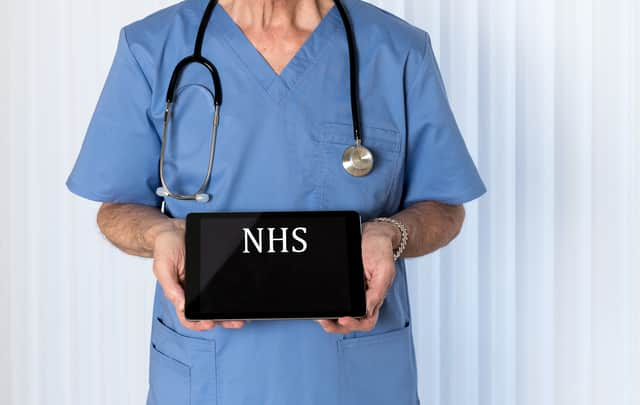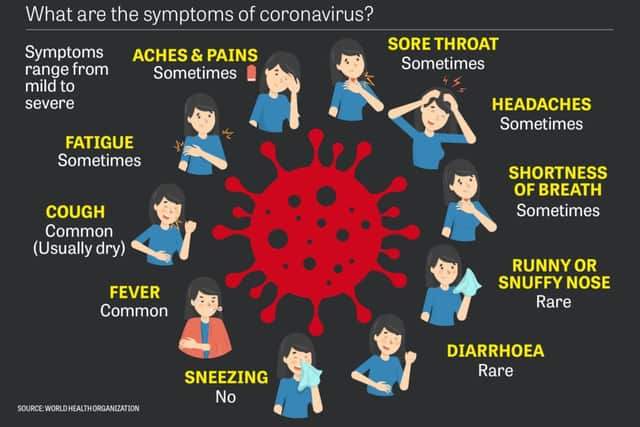Tens of thousands of retired doctors, nurses and emergency workers are being asked to return to work


Tens of thousands of retired healthcare professionals are being urged to return to work to help the NHS through the coronavirus crisis.
Letters are being sent to more than 65,000 retired doctors and nurses in England and Wales, in the hope that they return to help fight Covid-19.
Advertisement
Hide AdAdvertisement
Hide AdIn Scotland, anyone who left the medical profession during the past three years has also been asked to consider returning to the NHS.


(Photo: WHO)
Retired emergency staff, firefighters and police officers also being contacted
It is thought that retired emergency service staff could also come back, as well as recently retired firefighters under 70.
According to Mayor of London, Sadiq Khan, recently retired police officers were also being written to, in the hope that they could carry out administrative functions.
Final year medical students and student nurses could also be given temporary work to boost the ranks. Those who return will be assessed to see how they can best help the NHS fight the pandemic.
Your NHS Needs You
Advertisement
Hide AdAdvertisement
Hide AdAccording to the BBC, Ruth May, chief nursing officer for England, said, "I am urging all recent former nurses to lend us your expertise and experience during this pandemic, because I have no doubt that you can help to save lives.
“As the health service gears up to deal with the greatest global health threat in its history, my message to former colleagues is 'Your NHS Needs You'.”
Professor Stephen Powis, national medical director for the NHS, said returners "will make more of a difference than ever before - not just to patients, but to colleagues and the wider community".
Health Secretary Matt Hancock added, "To further boost the ranks of our NHS, we are now turning to people who have recently left the healthcare professions who can bring their experience and expertise to our health system.
Advertisement
Hide AdAdvertisement
Hide Ad"They can play a crucial role in maximising our capacity to fight this outbreak - and wherever they can help, they will be hugely welcomed."
The Nursing and Midwifery Council will write to 50,000 nurses whose registration has lapsed in the last three years, and the General Medical Council will contact another 15,500 doctors who have left since 2017.
Coronavirus: the facts
What is coronavirus?
COVID-19 is a respiratory illness that can affect lungs and airways. It is caused by a virus called coronavirus.
What caused coronavirus?
The outbreak started in Wuhan in China in December 2019 and it is thought that the virus, like others of its kind, has come from animals.
How is it spread?
Advertisement
Hide AdAdvertisement
Hide AdAs this is such a new illness, experts still aren’t sure how it is spread. But.similar viruses are spread in cough droplets. Therefore covering your nose and mouth when sneezing and coughing, and disposing of used tissues straight away is advised. Viruses like coronavirus cannot live outside the body for very long.
What are the symptoms?
The NHS states that the symptoms are: a dry cough, high temperature and shortness of breath - but these symptoms do not necessarily mean you have the illness. Look out for flu-like symptoms, such as aches and pains, nasal congestion, runny nose and a sore throat. It’s important to remember that some people may become infected but won’t develop any symptoms or feel unwell.
What precautions can be taken?
Washing your hands with soap and water thoroughly. The NHS also advises to cover your mouth and nose with a tissue or your sleeve (not your hands) when you cough or sneeze; put used tissues in the bin immediately and try to avoid close contact with people who are unwell. Also avoiding touching eyes, nose and mouth unless your hands are clean.
Government advice
As of Monday 16 March the government advised that everyone should be observing social distancing - avoiding unnecessary travel and working from home where possible. Anyone with a cough or cold symptoms now needs to self-isolate with their entire household for 14 days.
Advertisement
Hide AdAdvertisement
Hide AdThe government has also advised against going to the pub, out for dinner or partaking in any socialising with large groups. This has caused a number of closures across the country. Schools will close from Friday 20 March for the foreseeable future and exams have been cancelled.
The over 70s or anyone who is vulnerable or living with an underlying illness are being asked to be extra careful and stay at home to self-isolate.
For more information on government advice, please check their website.
Should I avoid public places?
The advice now is to avoid public places and any non-essential travel. Travel abroad is also being advised against for the next 30 days at least, and many European countries have closed their borders.
What should I do if I feel unwell?
Advertisement
Hide AdAdvertisement
Hide AdDon’t go to your GP but instead call NHS 111 or look online at the coronavirus service that can tell you if you need medical help and what to do next.
When to call NHS 111
NHS 111 should be used if you feel unwell with coronavirus symptoms, have been in a country with a high risk of coronavirus in the last 14 days or if you have been in close contact with someone with the virus.
Sources: World Health Organisation and NHS